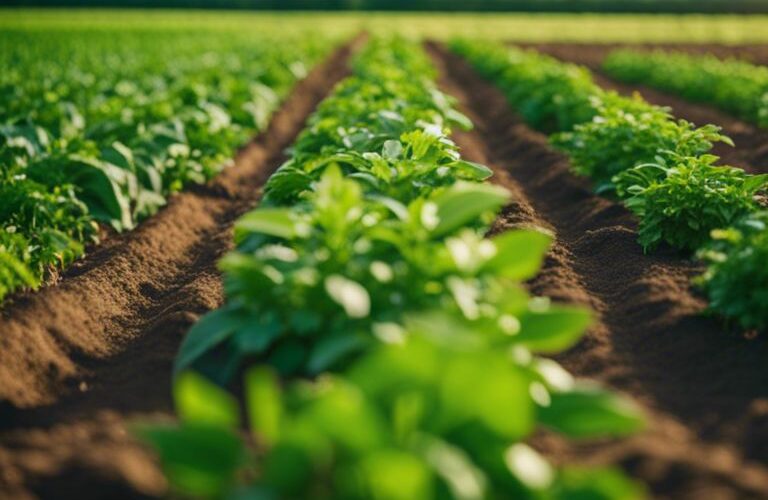You may not realize it, but animal manure is a valuable resource when it comes to enhancing crop production. Rich in essential nutrients like nitrogen, phosphorus, and potassium, animal manure can improve soil fertility and increase crop yields significantly. In this blog post, we will investigate into the nutritional benefits of using animal manure in agriculture and explore how farmers can harness its potential to optimize crop growth sustainably. Let’s uncover the secrets of this natural fertilizer and how it can revolutionize modern farming practices.
Table of Contents
Understanding Animal Manure
The use of animal manure in agriculture has been a practice for centuries, providing essential nutrients for crop growth. It is important to understand the different types of animal manure available and their nutrient composition to utilize them effectively in crop production.
Types of Animal Manure
There are several types of animal manure commonly used in agriculture, including cattle, poultry, hog, sheep, and horse manure. Each type varies in nutrient composition and application, making it essential for farmers to choose the right kind for their crops. Cattle manure is rich in nitrogen and phosphorus, while poultry manure is higher in nitrogen, phosphorus, and potassium. Hog manure is known for its high levels of nitrogen, phosphorus, and calcium. Sheep and horse manure also provide valuable nutrients for plant growth.
| Cattle Manure | Rich in nitrogen and phosphorus |
| Poultry Manure | Higher in nitrogen, phosphorus, and potassium |
| Hog Manure | High levels of nitrogen, phosphorus, and calcium |
| Sheep Manure | Valuable nutrients for plant growth |
| Horse Manure | Provides essential nutrients for crops |
Assume that cattle manure would be more beneficial for crops that require higher levels of nitrogen, while poultry manure might be suitable for those in need of potassium as well. Understanding the nutrient content of each type of animal manure is crucial for making informed decisions in crop production.
Nutrient Composition and Benefits
Understanding the nutrient composition of animal manure is essential for maximizing its benefits in crop production. Each type of manure offers a unique blend of nitrogen, phosphorus, and potassium, along with other micronutrients that are crucial for plant growth. By incorporating animal manure into the soil, farmers can improve soil structure, water retention, and overall crop yield.
Animal manure helps replenish nutrients in the soil, promotes microbial activity, and enhances soil fertility in a sustainable manner. The use of animal manure in crop production is not only cost-effective but also environmentally friendly, reducing the dependency on synthetic fertilizers and minimizing nutrient runoff into water sources.
Methods of Application
Direct Application Techniques
One of the most straightforward methods of applying animal manure to crops is through direct application techniques. This involves spreading the manure directly onto the fields where the crops will be grown. Methods such as broadcasting, banding, and spot application can be used to ensure an even distribution of nutrients across the field. Direct application can provide an immediate source of nutrients to the plants, promoting healthy growth and improving soil fertility.
To maximize the benefits of direct application, it is important to consider the nutrient content of the manure, the timing of application, and the specific requirements of the crop being grown. Proper calibration of application equipment is essential to avoid over-application, which can lead to nutrient imbalances and environmental pollution. By following best practices for direct application, farmers can harness the nutritional benefits of animal manure effectively and sustainably.
Composting and Manure Management
One of the most popular methods of utilizing animal manure in crop production is through composting and manure management. Composting animal manure can help to reduce pathogens, weed seeds, and odors, while also stabilizing nutrients for slow release into the soil. This process involves mixing manure with other organic materials such as straw, crop residues, or composting bulking agents, and allowing the mixture to decompose under controlled conditions.
To ensure successful composting and manure management, it is important to monitor temperature, moisture content, and aeration levels throughout the process. Properly composted manure can serve as a valuable soil amendment, improving soil structure, water retention, and microbial activity. Incorporating composted manure into crop production systems can help to build soil health and fertility over time, leading to sustainable agricultural practices.
Plus, the compost produced from animal manure can also reduce the need for synthetic fertilizers, thus lowering input costs and minimizing the environmental impact of farming operations. When managed effectively, composting and manure management can unlock the full potential of animal manure as a valuable resource in crop production.
Maximizing Crop Yield
Keep in mind that the integration of animal manure into crop production can significantly enhance yields. To make the most of this sustainable practice, it is crucial to carefully plan how manure is incorporated into crop rotation schedules.
Integrating Manure with Crop Rotation Plans
Crop rotation plays a pivotal role in maintaining soil fertility and preventing the buildup of pests and diseases. By strategically incorporating animal manure into crop rotation plans, farmers can enhance soil structure, increase nutrient availability, and ultimately boost crop yields. It is essential to consider the nutrient requirements of different crops and adjust the application rates of manure accordingly.
Moreover, integrating manure with crop rotation plans can help reduce the reliance on synthetic fertilizers, thereby promoting a more sustainable and environmentally friendly approach to crop production. Farmers should carefully monitor the nutrient levels in the soil to ensure that the crops receive adequate nutrition throughout their growth cycle.
Monitoring Soil Health for Optimized Use
With regular monitoring of soil health, farmers can make informed decisions about the application of animal manure to maximize crop yield. Monitoring tools such as soil tests and visual assessments can provide valuable insights into the nutrient levels, pH balance, and organic matter content of the soil. By analyzing this data, farmers can adjust their manure application rates to meet the specific needs of their crops.
Maximizing crop yield through the optimized use of animal manure requires a proactive approach to soil management. By monitoring soil health regularly and adjusting manure applications as needed, farmers can ensure that their crops receive the necessary nutrients for optimal growth and productivity.
Environmental Considerations
After exploring the nutritional benefits of animal manure in crop production, it is crucial to consider the environmental implications of its use. Proper management of animal manure is essential to prevent negative impacts on water quality and minimize greenhouse gas emissions.
Manure Management and Water Quality
For farmers using animal manure as a fertilizer, it is important to implement best management practices to protect water quality. Improper application of manure can result in nutrient runoff into water bodies, leading to water pollution and algal blooms. This can have detrimental effects on aquatic ecosystems and human health. To mitigate these risks, farmers should carefully plan manure application timing and rates, consider weather conditions, and utilize technologies such as cover crops and buffer zones.
Proper manure storage and handling facilities are also critical in preventing nutrient leaching and groundwater contamination. Regular maintenance and monitoring of storage structures can help minimize the risk of accidental spills and leaks, protecting both surface and groundwater quality. By following guidelines set forth by regulatory agencies and seeking assistance from agricultural extension services, farmers can actively contribute to preserving water quality in their communities.
Reducing Greenhouse Gas Emissions
Any agricultural practice involving animal manure has the potential to generate greenhouse gas emissions, particularly methane and nitrous oxide. These gases contribute to climate change and have significant environmental implications. To reduce emissions associated with manure application, farmers can adopt practices such as anaerobic digestion, composting, and incorporating manure into the soil promptly after application. These approaches can help capture methane for energy production, reduce nitrous oxide emissions, and improve soil health.
Water management and nutrient cycling play a crucial role in minimizing greenhouse gas emissions from manure application. By integrating manure as a nutrient source strategically within cropping systems, farmers can enhance nutrient use efficiency, reduce the need for synthetic fertilizers, and lower overall greenhouse gas emissions. Sustainable manure management practices not only benefit crop production but also contribute to mitigating climate change and preserving environmental quality for future generations.
Conclusion
Following this study on unlocking the nutritional benefits of animal manure in crop production, it is evident that utilizing manure as a fertilizer can significantly improve soil health and boost crop yields. The organic matter, nutrients, and beneficial microorganisms contained in animal manure play a crucial role in promoting plant growth and enhancing crop resilience to environmental stressors. By carefully managing the application of animal manure, farmers can harness its full potential as a sustainable and cost-effective source of nutrients for their crops. As we continue to explore innovative ways to enhance agricultural sustainability, integrating animal manure into crop production systems is a promising strategy for improving soil fertility and optimizing food production.
FAQ
Q: What are the nutritional benefits of using animal manure in crop production?
A: Animal manure is rich in essential nutrients such as nitrogen, phosphorus, and potassium, which are vital for plant growth and development. It also contributes to soil fertility and improves soil structure and water retention.
Q: How can animal manure be effectively utilized in crop production?
A: Animal manure can be applied to fields as organic fertilizer to replenish nutrient levels in the soil. It can be composted to reduce pathogens and weed seeds, making it safer for use in crop production. Additionally, it can be used in conjunction with other fertilizers to create a balanced nutrient mix for crops.
Q: Are there any potential risks associated with using animal manure in crop production?
A: While animal manure is a valuable source of nutrients, improper application can lead to nutrient imbalances, water pollution, and contamination of crops with pathogens. It is important to follow proper guidelines for application and allow for adequate time between manure application and harvest.
Q: How does animal manure contribute to sustainable agriculture practices?
A: By recycling nutrients and organic matter, animal manure helps to reduce the reliance on synthetic fertilizers, which can have negative environmental impacts. It also promotes soil health and biodiversity, making farming practices more sustainable in the long term.
Q: What are the best practices for using animal manure in crop production?
A: To maximize the nutritional benefits of animal manure, it is important to properly store, handle, and apply it in accordance with local regulations. Testing the manure for nutrient content can help determine the appropriate application rate, and incorporating it into a comprehensive nutrient management plan can ensure optimal results for crop production.

Our contributing author is a passionate advocate for eco-friendly living and sustainability. With a background in eco-life, they are dedicated to inspiring and empowering individuals to adopt environmentally conscious lifestyles. Through insightful articles, they share practical tips, innovative solutions, and thought-provoking perspectives to promote a greener, more sustainable world. Join them on the journey towards eco-smart living and discover how small choices can make a big impact. 🌱









